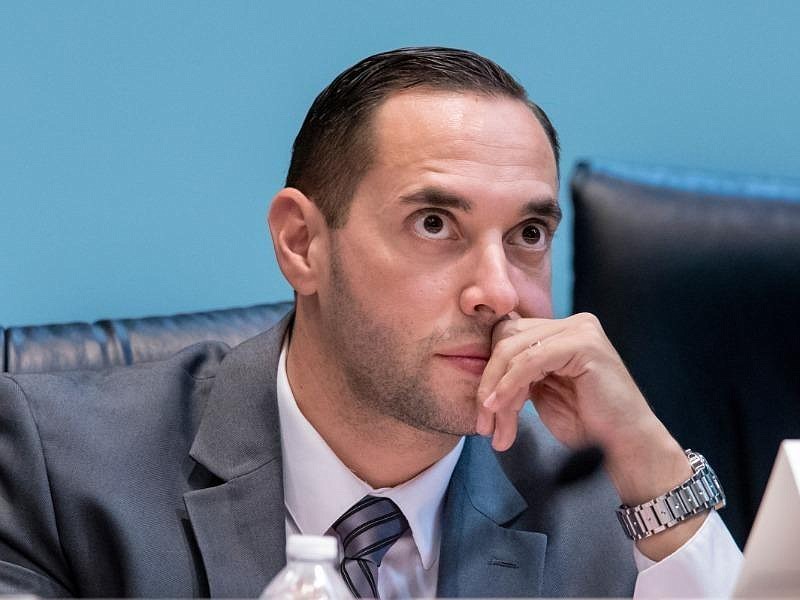- January 15, 2025
-
-
Loading

Loading

Overriding objections from Democrats who called the measure “wrong on all levels,” the Republican-controlled Florida House on Thursday, Feb. 24, passed a bill that would limit how race-related concepts are taught in schools and in workplace training sessions.
The House voted 74-41 along straight party lines to approve the bill (HB 7).
Under the measure, school instruction or workplace training would constitute discrimination if it “compels” people to believe certain concepts.
For example, the measure targets training sessions that would lead people to believe that they bear “responsibility for, or should be discriminated against or receive adverse treatment because of, actions committed in the past by other members of the same race” or sex.
Part of the bill dealing with schools would label instruction discriminatory if it would lead students to “feel guilt, anguish, or other forms of psychological distress because of actions, in which the person played no part” committed by people of the same race or sex.
The bill, which was given the title “Individual Freedom,” sparked a lengthy, sometimes-emotional debate.
“This bill makes it clear that in Florida, people will be judged as individuals by their words, by their character, and by their actions — not by their race, by their sex or by their national origin,” said sponsor Bryan Avila, a Miami Springs Republican who is a top lieutenant of House Speaker Chris Sprowls, R-Palm Harbor.
Debate centered, in part, on whether the bill could have a chilling effect on educators and employers’ ability to discuss real-world issues related to race.
Rep. Kelly Skidmore, D-Boca Raton, criticized the proposal as seeking to “silence” teachers.
“Anyone can read a history book, learning the facts. But the utility of teachers, professors, presenters, scholars, is to help facilitate the conversation, the analysis, of what we are doing. Silencing people is never right. And what you’re doing with this bill is silencing people’s ability to talk about deep and meaningful issues,” Skidmore said.
But Rep. Colleen Burton, R-Lakeland, argued the measure is aimed at preventing “a certain ideology” from being injected into instruction for students or workers.
“What this bill does is ensures for the future that it stays that way. And that it’s very, very clear to educators across the state of Florida, whether they’re educating in classrooms or whether they’re doing training in businesses … that what we teach and what we talk about in those instances is fact,” Burton said.
The bill does not specifically mention critical race theory, which is based on the premise that racism is embedded in American society and institutions. But the measure came after Gov. Ron DeSantis announced a legislative proposal dubbed the “Stop Wrongs Against Our Kids and Employees Act,” or Stop WOKE Act.
Rep. Dianne Hart, D-Tampa, said that the measure is connected to a recent push by Republicans to target critical race theory.
“This bill is really about critical race theory, even though we say that’s not the name of it, it’s ‘freedom.’ We all know that although not explicitly mentioned in the bill, that is exactly what this is about,” Hart said.
Hart also disputed that critical race theory is taught in public schools, questioning why the bill is needed. She pointed to a rule passed last year by the state Board of Education to prevent the teaching of critical race theory.
Lawmakers on Thursday approved a change that lists certain topics educators would be allowed to teach, including lessons on “how the individual freedoms of persons have been infringed by slavery, racial oppression” and segregation. The change also would make clear that teachers can offer lessons about “topics relating to the enactment and enforcement of laws resulting in racial oppression” and discrimination.
The change was proposed by Rep. Christopher Benjamin, a Miami Gardens Democrat who is Black.
“A lot of things have been said about what the bill doesn’t allow. And I wanted to make sure that any chilling effect that this (bill) would have on the education of Black studies would be quelled. So, this section ensures that teachers understand the issues that are still on the table for which they can teach, as it relates to the racial issues here in Florida and these United States,” Benjamin said.
A similar Senate bill (SB 148) needs approval from the Rules Committee before it could go to the full Senate.